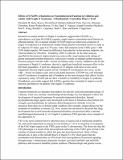Effects of STX209 (Arbaclofen) on Neurobehavioral Function in Children and Adults with Fragile X Syndrome: A Randomized, Controlled, Phase 2 Trial
Author(s)
Berry-Kravis, Elizabeth M.; Hessl, David; Rathmell, Barbara; Zarevics, Peter; Cherubini, Maryann; Walton-Bowen, Karen; Mu, Yi; Nguyen, Danh V.; Gonzalez-Heydrich, Joseph; Wang, Paul P.; Carpenter, Randall L.; Hagerman, Randi J.; Bear, Mark; ... Show more Show less
Downloadbear3.pdf (557.4Kb)
OPEN_ACCESS_POLICY
Open Access Policy
Creative Commons Attribution-Noncommercial-Share Alike
Terms of use
Metadata
Show full item recordAbstract
Research on animal models of fragile X syndrome suggests that STX209, a γ-aminobutyric acid type B (GABA[subscript B]) agonist, might improve neurobehavioral function in affected patients. We evaluated whether STX209 improves behavioral symptoms of fragile X syndrome in a randomized, double-blind, placebo-controlled crossover study in 63 subjects (55 male), ages 6 to 39 years, with a full mutation in the FMR1 gene (>200 CGG triplet repeats). We found no difference from placebo on the primary endpoint, the Aberrant Behavior Checklist—Irritability (ABC-I) subscale. In the other analyses specified in the protocol, improvement was seen on the visual analog scale ratings of parent-nominated problem behaviors, with positive trends on multiple global measures. Post hoc analysis with the ABC—Social Avoidance scale, a newly validated scale for the assessment of fragile X syndrome, showed a significant beneficial treatment effect in the full study population. A post hoc subgroup of 27 subjects with more severe social impairment showed improvements on the Vineland II–Socialization raw score, on the ABC—Social Avoidance scale, and on all global measures. STX209 was well tolerated, with 8% incidences of sedation and of headache as the most frequent side effects. In this exploratory study, STX209 did not show a benefit on irritability in fragile X syndrome. Nonetheless, our results suggest that GABA[subscript B] agonists have potential to improve social function and behavior in patients with fragile X syndrome.
Date issued
2012-09Department
Massachusetts Institute of Technology. Department of Brain and Cognitive SciencesJournal
Science Translational Medicine
Publisher
American Association for the Advancement of Science (AAAS)
Citation
Berry-Kravis, E. M., D. Hessl, B. Rathmell, P. Zarevics, M. Cherubini, K. Walton-Bowen, Y. Mu, et al. “Effects of STX209 (Arbaclofen) on Neurobehavioral Function in Children and Adults with Fragile X Syndrome: A Randomized, Controlled, Phase 2 Trial.” Science Translational Medicine 4, no. 152 (September 19, 2012): 152ra127–152ra127.
Version: Author's final manuscript
ISSN
1946-6234
1946-6242